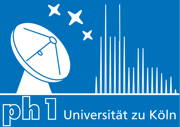About Us
Universität zu Köln
The University of Cologne is one of the largest universities in Germany with about 49000 students and about 6000 employees working in a broad range of disciplines. The physics department at the university consists of four institutes: astrophysics, theoretical physics, nuclear physics, and solid state physics.
The research carried out at the devision of astrophysics focuses on the fundamental understanding of star-forming processes in the interstellar medium (ISM) and the evolution of galaxies. Its activities cover observational astrophysics, laboratory astrophysics, instrumentation and modeling in order to explore conditions and impact of star formation by looking at the physical, chemical and dynamic state of the ISM. Its strength is in particular, the close collaboration between observers and laboratory astrophysics in the field of high resolution spectroscopy.
It is involved in large Space and Ground Instrumental Projects for Study of Stars, Planets, Interstellar Medium, such as the airborne observatory Sofia, and the space observatory Herschel.
For more information visit this website : http://www.astro.uni-koeln.de/
Role-
University of Cologne has been one of the key members of VAMDC from the beginning, with major contributions to the definition of standards and its application, as well as in developing software librairies and tools.
Databases and Services-
The Virtual Atomic and Molecular Data Center is a consortium of services & databases. Among the currently available databases, KÖLN hosts the Cologne Database for Molecular Spectroscopy (CDMS).
CDMS contains a catalog of radio frequency and microwave to far-infrared spectral lines of atomic and molecular species that (may) occur in the interstellar or circumstellar medium or in planetary atmospheres. The catalog is continuously updated.
Scientific Interest of VAMDC Members-
The research focus of University of Cologne VAMDC members of University currently lies in the area of star-formation and laboratory astrophysics, in particular high resolution moleculear spectroscopy.
Contact-
Partner/Node contact: S. Schlemmer (schlemmer[at]ph1.uni-koeln.de)

